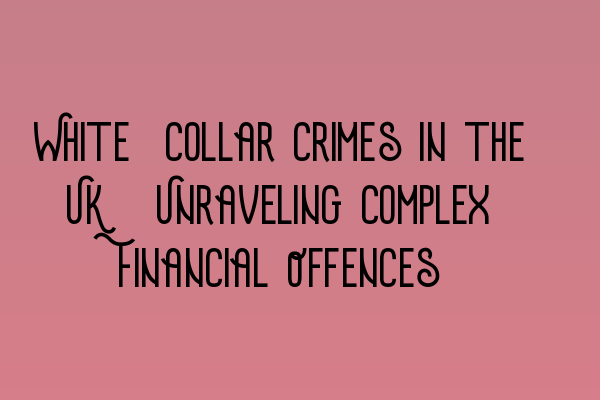White-Collar Crimes in the UK: Unraveling Complex Financial Offences
If you’ve ever watched a crime drama, you may have heard the term “white-collar crimes.” These are non-violent crimes typically committed by individuals or organizations in business or professional settings, involving deceit, fraud, or other illegal schemes for financial gain. With the increasing complexities of modern finance and technology, white-collar crimes have become more prevalent and challenging to investigate and prosecute.
In the United Kingdom, white-collar crimes can have severe consequences for both the individuals involved and the economy as a whole. As a solicitor specializing in criminal law and practice, it is crucial to have a deep understanding of these complex financial offences to represent your clients effectively.
Types of White-Collar Crimes
White-collar crimes encompass a wide range of illegal activities that often involve deception, manipulation, or abuse of trust. Common types of white-collar crimes in the UK include:
- Fraud – This involves the deliberate deception for financial gain, such as insurance fraud, credit card fraud, or tax evasion. Frauds can be committed by individuals, businesses, or even organized crime groups.
- Money Laundering – The process of disguising the proceeds of criminal activity to make them appear legitimate. Money laundering often involves a complex web of transactions and financial institutions.
- Insider Trading – The illegal buying or selling of securities based on non-public information, often obtained by individuals within a company. This practice undermines the integrity of financial markets.
- Embezzlement – The misappropriation or theft of funds entrusted to an individual in a position of trust, such as a company executive or a public official.
- Identity Theft – The unauthorized use of someone’s personal information to commit fraud or other illegal activities.
Investigating and Prosecuting White-Collar Crimes
Due to the complexity of white-collar crimes, their investigation and prosecution can be challenging. It requires a combination of legal expertise, financial knowledge, and the ability to navigate intricate financial transactions. As a solicitor specializing in criminal law and practice, you must have a deep understanding of various investigative techniques, such as:
- Forensic accounting – Examining financial records and transactions to identify signs of fraud or money laundering.
- Digital forensics – Analyzing electronic devices and networks to uncover digital evidence related to the crime.
- Interview techniques – Conducting interviews and interrogations to extract valuable information from witnesses and suspects.
- Asset tracing – Tracing and recovering assets that have been hidden or dispersed to avoid detection or confiscation.
To build a successful case against white-collar criminals, solicitors need to gather sufficient evidence, analyze complex financial data, and present their findings in a clear and compelling manner. The prosecution of white-collar crimes often involves collaboration with regulatory bodies, such as the Financial Conduct Authority and the Serious Fraud Office, to ensure effective enforcement of the law.
Defending Against White-Collar Crimes
As a solicitor, your role is not only to prosecute but also to defend. Individuals accused of white-collar crimes deserve fair representation to ensure their legal rights are protected. Defending against white-collar crimes requires a meticulous approach, including:
- Thoroughly reviewing the evidence to identify any weaknesses or inconsistencies.
- Engaging forensic accountants and experts to challenge the prosecution’s financial analysis.
- Exploring possible defenses, such as lack of intent, duress, or lawful authority.
- Negotiating with prosecutors to achieve the best possible outcome for your client, which can include reduced charges or penalties.
By providing skilled legal representation, you play a crucial role in upholding the principles of justice and ensuring a fair trial for all individuals involved in white-collar crime cases.
Stay Informed and Prepared
Keeping up with the developments and intricacies of white-collar crimes is essential in the fast-paced legal field. At SQE Criminal Law & Practice Law UK, we offer comprehensive SQE exam dates and preparation courses for both SQE 1 and SQE 2. Our SQE 1 preparation courses and SQE 2 preparation courses equip you with the knowledge and skills necessary to excel in your career as a solicitor.
Are you preparing for the SQE 1 exam? Test your knowledge with our SQE 1 Practice Exam Questions and enhance your performance with our SQE 1 Practice Mocks FLK1 FLK2. Prepare with confidence and achieve success in your legal profession.
White-collar crimes continue to pose significant challenges in the legal landscape. By staying informed, acquiring essential knowledge, and continuously improving your skills, you can navigate the complexities of these financial offences and make a meaningful impact as a solicitor.
